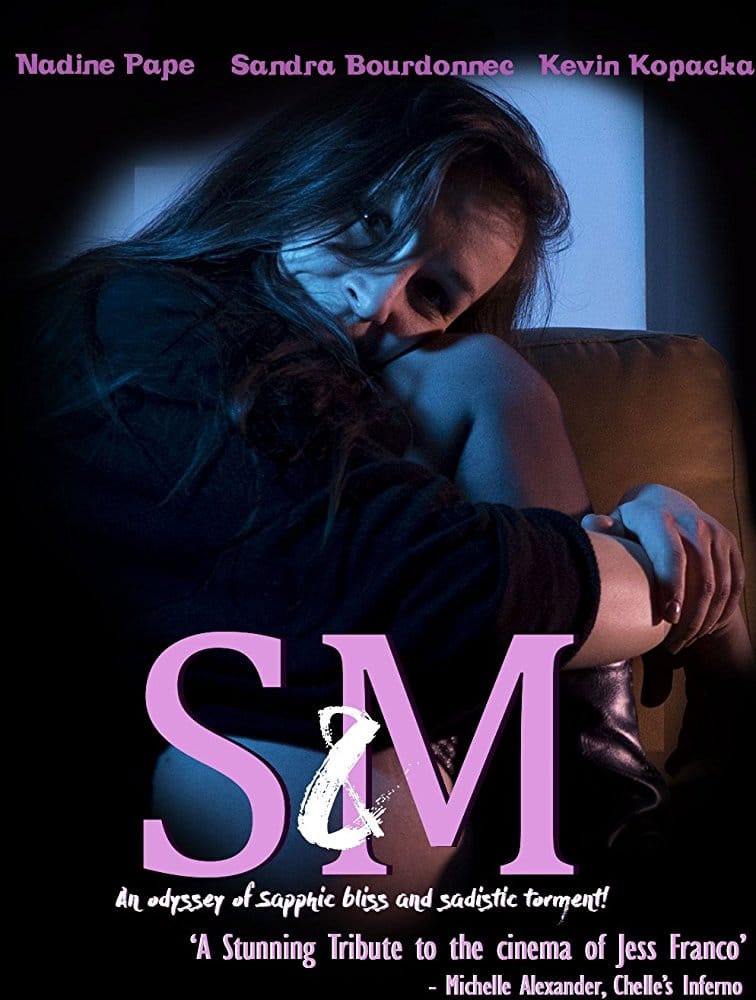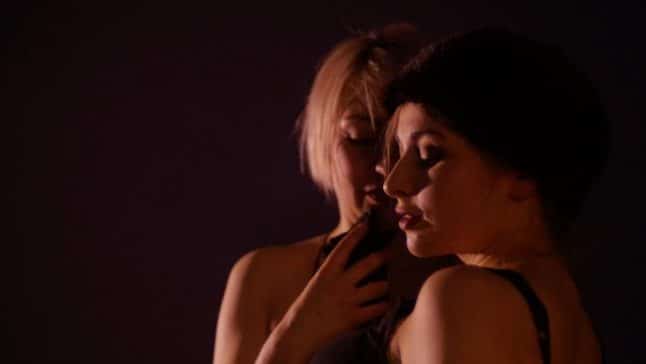 It’s a very rare thing indeed to see a filmmaker working in the styles so far chosen by director Alex Bakshaev in his career to date. His last film, The Devil of Kreuzberg, was to my mind a languid and stylish love letter to Jean Rollin; in S&M, Les Sadiques, we have a film not only openly dedicated to Jess Franco, but one clearly taking its visual cues from Uncle Jess – and on a budget of a mere 250 Euros, working within the confines of a budget which would startle even Franco. However, in common with The Devil of Kreuzberg, there’s so much evident love for source material which doesn’t tend to hold much sway over modern filmmakers, that it’s impossible not to be impressed and to an extent, entranced by the results.
It’s a very rare thing indeed to see a filmmaker working in the styles so far chosen by director Alex Bakshaev in his career to date. His last film, The Devil of Kreuzberg, was to my mind a languid and stylish love letter to Jean Rollin; in S&M, Les Sadiques, we have a film not only openly dedicated to Jess Franco, but one clearly taking its visual cues from Uncle Jess – and on a budget of a mere 250 Euros, working within the confines of a budget which would startle even Franco. However, in common with The Devil of Kreuzberg, there’s so much evident love for source material which doesn’t tend to hold much sway over modern filmmakers, that it’s impossible not to be impressed and to an extent, entranced by the results.
Marie (Nadine Pape) is a young girl looking for a place to stay in Berlin, having fled from a troubled home life with her father. But try as she might, her attempts to find somewhere to crash end in disaster, and she’s about to bed down on a stairwell when she encounters Sandra (the fabulous Sandra Bourdonnec). Sandra offers her a place to stay, but her interest in Marie is clearly far from platonic; fascinated by the older woman’s repertoire and career as an erotic photographer, as well as beholden to her for a comfortable place to live, she decides to stick around. Gradually, Sandra begins to extol her philosophy on sex and power, revealing that she does her job so well because she understands the importance of controlling her environment, and her subjects. Soon working alongside Sandra as a kind of honey trap to get otherwise unwitting subjects back to Sandra’s studio, Marie soon begins to explore her own sadistic impulses. However, the course of true love never did run smooth, and the outside world begins to impinge on the two women’s pursuits in a series of intrusive ways.
I mentioned Jess Franco earlier, and in terms of the influences of particular films I feel that there are several similarities between Les Sadiques and Eugenie De Sade, right down to some of the visuals (the clothing worn by the two women looks very similar to that worn by Soledad Miranda in some of her scenes – as do some of Nadine Pape’s poses – and who in their right mind could ever have a problem with that?) Of course, Franco took his cues from De Sade himself, although he took the Marquis’s ideas in rather different directions, and aside from the fact that Marie can be seen actually reading de Sade, this film is also about transforming some of de Sade’s ideas and placing them in a contemporary setting. In some respects Sandra’s character is like Madame de Saint-Ange, a homeowner whose erotic pursuits influence the education of a rather naive young girl, for instance.
 But as much as Jess Franco – and de Sade – are acknowledged influences on S&M: Les Sadiques, the overall style of the film is less uproarious than many a Jess Franco film, generally preferring atmosphere over action, and developing said atmosphere in meticulous ways. Whilst a sexual film in terms of its themes, the director is very selective about what is shown, though without shying away from nudity and encompassing one quite startling and brutal scene, too. The topics of control and consent are de facto explored here, though is a subtle array of ways. There is, again, a touch of magic in how Bakshaev manages to shoot Berlin, making the city look by turns very modern and recognisable, but then timeless, expressed through a series of interesting shots. The atmosphere also owes a great deal to the film’s minimal dialogue – sometimes we do not hear what characters are saying at all as they are not miked – and exposition. We simply accept Sandra and Marie’s relationship grows seemingly out of nowhere, for instance, because it just works that way, and it’s plausible within the confines of the film’s universe. The camera lingers on facial expressions and gestures in a very effective way too, adding to the pleasingly disorientating effect of the filming style overall. This is altogether quieter than the films which have inspired Les Sadiques, but genuinely works well and showcases a confident, ambitious set of attitudes to making cinema. A special mention has to go to Sandra Bourdonnec here, too, who is joined by a great cast but whose magnetism is quite unlike anything else on the screen: the star of The Devil of Kreuzberg exudes the kind of smouldering appeal which would not look amiss in any of the classic Euro horror or arthouse cinema we know and love.
But as much as Jess Franco – and de Sade – are acknowledged influences on S&M: Les Sadiques, the overall style of the film is less uproarious than many a Jess Franco film, generally preferring atmosphere over action, and developing said atmosphere in meticulous ways. Whilst a sexual film in terms of its themes, the director is very selective about what is shown, though without shying away from nudity and encompassing one quite startling and brutal scene, too. The topics of control and consent are de facto explored here, though is a subtle array of ways. There is, again, a touch of magic in how Bakshaev manages to shoot Berlin, making the city look by turns very modern and recognisable, but then timeless, expressed through a series of interesting shots. The atmosphere also owes a great deal to the film’s minimal dialogue – sometimes we do not hear what characters are saying at all as they are not miked – and exposition. We simply accept Sandra and Marie’s relationship grows seemingly out of nowhere, for instance, because it just works that way, and it’s plausible within the confines of the film’s universe. The camera lingers on facial expressions and gestures in a very effective way too, adding to the pleasingly disorientating effect of the filming style overall. This is altogether quieter than the films which have inspired Les Sadiques, but genuinely works well and showcases a confident, ambitious set of attitudes to making cinema. A special mention has to go to Sandra Bourdonnec here, too, who is joined by a great cast but whose magnetism is quite unlike anything else on the screen: the star of The Devil of Kreuzberg exudes the kind of smouldering appeal which would not look amiss in any of the classic Euro horror or arthouse cinema we know and love.
Whilst S&M: Les Sadiques will have some problems finding its audience, perhaps being too arty for some and too challenging for others, I feel that fans of the kinds of Euro cinema mentioned above will be beguiled by Bakshaev’s zeal for homage and atmospherics, and impressed by his ability to make something which is just so deliberately different. 250 Euros is a ridiculously small budget, but yet he’s managed to do a great deal with it; I can only hope that more funding comes his way, and soon, as I’m genuinely gratified that someone out there is making films like this, so completely unconcerned with the more tedious aspects of the current cinematic zeitgeist.
